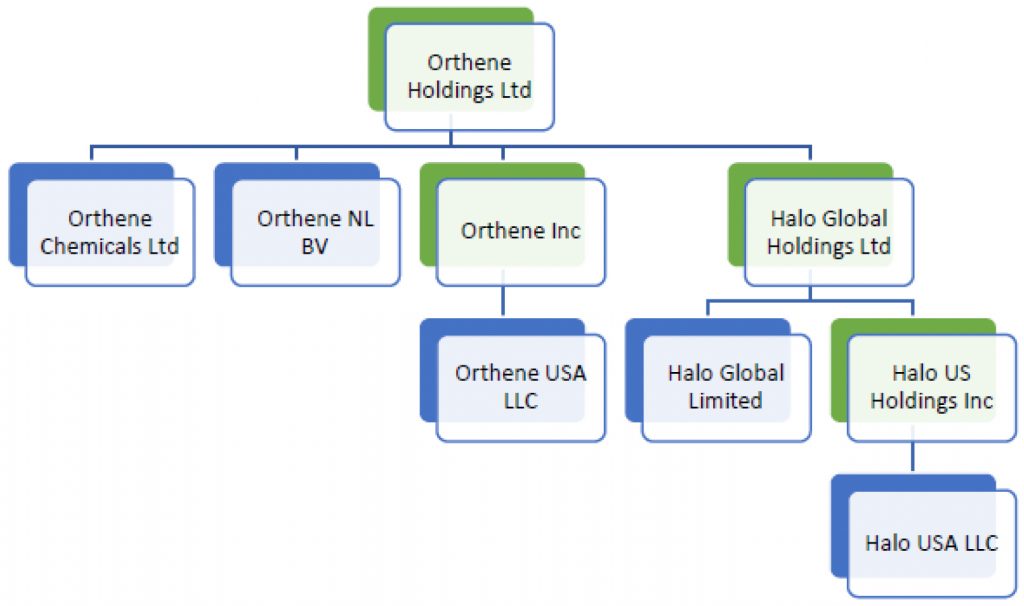Slavery and Human Trafficking Report
Introduction
Orthene Chemicals is a brake fluid manufacturing company based in Harrow in the United Kingdom. It’s focus is on high-performance brake fluids, with suppliers and customers spread through both UK and the globe. It’s 2024 sales turnover was £43.2 million and it employs over seventy employees, mostly from the local area.
Orthene is committed to ensuring that it does not in any way promote, use or rely upon slavery in any form in order to conduct its business. It has taken steps to ensure that it and its supply chains remain slavery-free.
Organisation structure and supply chains.
Orthene Chemicals Ltd. is part of Orthene Holdings Ltd group. This includes a wide number of companies- all family owned- spread across the UK, US and EU:

Orthene maintains a complex supply chain of over thirty suppliers for its products and packaging. The majority of the raw ingredients purchased are obtained from European suppliers, with a handful originating in North or South America. A small number of suppliers are based in other regions, such as Taiwan and South Korea.
Slavery and Trafficking Policy
Orthene has developed a Working Conditions Policy. This policy supports Orthene’s commitment to:
- Provide fair and legal remuneration.
- Comply with UK law on working hours.
- To provide a safe workplace.
- Protect workers from illegal discrimination or harassment.
- Recruit workers without unfair discrimination.
- Behave as good neighbours towards the local community.
- Never use forced or compulsory labour.
- Not deny workers their legal right to association and collective bargaining.
- Not use child labour unless under a legally approved state backed scheme.
Orthene Chemicals is committed to operating ethically and responsibly, extending beyond our core business operations. Our Equality, Diversity, and Inclusion (EDI) policy forms an integral part of our anti-slavery strategy. By fostering a workplace where all individuals are valued, respected, and treated fairly, we create an environment that is less susceptible to modern slavery and human trafficking. Our EDI initiatives enhance employee engagement, strengthen our supply chain relationships, and contribute to a culture of openness and transparency, which are essential components of effective anti-slavery measures.
Risk assessment and management
Orthene has performed a risk analysis of the possibility of slavery or trafficking. The two major identified risks were:
- The risk that Orthene may directly rely on forced or trafficked labour at its Harrow site.
- The risk that Orthene may, through its upstream supply chain, promote or rely upon forced or trafficked labour for the production of its raw materials and packaging.
These risks were addressed via a number of due diligence processes as outlined below:
Due Diligence Processes
Internal checks
As part of the recruitment and onboarding process all employees go through an induction process which incorporates the UK legal requirement of right to work and identification checks. All employees are checked for their right to work and all documentation is logged on their file and monitored.
All employees are issued with a full time working hours employment contract ensuring all employment rights are upheld. Orthene is an accredited Real Living Wage employer which ensures fair pay across the whole organisation.
Orthene has a whistleblowing hotline to enable employees to report any wrong doing.
Training
Onboarding training for all new starters includes Orthene Code of Conduct training which incorporates Anti-Slavery training. This Code of Conduct training is conducted on a 2 yearly programme for all employees.
Supply Chains
With regards to Orthene’s supply chains, it has conducted a review of its major suppliers. This review was performed in Q1 2024. In each instance the supplier was requested to confirm that-
- Their company does not use forced labour. (100% of respondents confirmed positive)
- Their supply chains are free of forced labour. (83% of respondents confirmed positive).
- They investigated or audited their supply chains for evidence of forced labour. (67% of respondents confirmed positive).
- They have an anti-slavery statement or policy (67% of respondents confirmed positive).
As per Orthene policy, new suppliers will be queried as to their anti-slavery policies as part of their initial setup.






